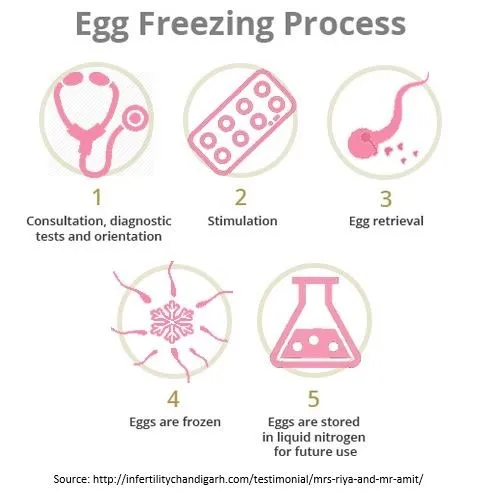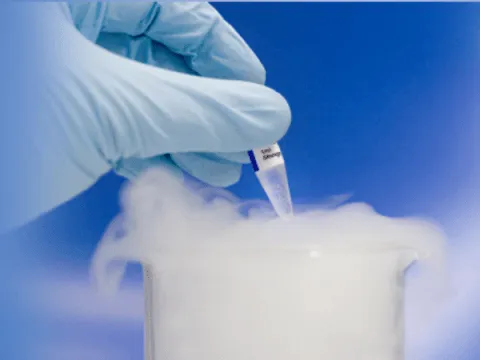There should be no pressure to have a child; individuals and couples should conceive and bring their child into the world when they are ready.
Oocyte cryopreservation, also known as egg freezing, can help you do this, extending your fertility for years since many women focus on driving a successful career and aim to bring their children into the world later in life. Egg freezing has grown in popularity over time, and the method has become increasingly sophisticated.
Nisha IVF, one of the best IVF centre in Ahmedabad, offers safe and cost-efficient oocyte cryopreservation services. To help you decide whether or not to freeze your eggs, here’s everything you need to know about oocyte cryopreservation.
First, let’s know,
What is Oocyte Cryopreservation?
The technique of harvesting and freezing a female’s eggs to stop their biological clocks and preserve their reproductive potential for when they are ready is known as oocyte cryopreservation or egg freezing. It allows women to maintain their healthiest and strongest eggs for fertility treatments like IUI or IVF while extending their fertility into their late 30s and 40s.
Frozen oocytes can be kept for up to 55 years or until you are ready to start the process of becoming a parent. When you store frozen eggs for extended periods, there is no detrimental effect, and you will get the best results if you freeze your eggs in your mid-to-late twenties. If you wish to freeze your eggs, don’t wait any longer than necessary; younger eggs are healthier and more likely to survive the freezing process.
Now, let’s know,
Who are Suitable Candidates for Egg-freezing?
The procedure of oocyte cryopreservation may be considered for a variety of reasons. Individuals suffering from the following conditions are usually suitable candidates for egg freezing:
Educational and career goals: If you want to pursue a degree or a challenging career, you can freeze your eggs. So, you may rest assured that the eggs will be safe to use when you need them.
Personal reasons: If you wish to start a family with a partner but don’t have one yet, you can freeze your eggs and use them later when you do.
Cancer treatment: Cancer therapies can affect your ability to conceive. Ovaries may be removed if you have reproductive cancer. Fertility can be harmed by cancer therapy, but egg freezing can assist.
Infections and other medical issues: Fertility can be harmed by a variety of issues. Endometriosis is a disorder that causes uterine tissue to develop outside of the womb. If you have a severe sickness, such as early ovarian failure due to chromosomal abnormalities or an ovarian disorder that raises the risk of ovary damage, freezing eggs can help you conceive.
Let’s discuss,
The Actual Process of Oocyte Cryopreservation
Before the stimulation cycle, the fertility specialist evaluates the female’s ovarian reserve to calculate the potential yield of the oocytes. The examination includes a pelvic ultrasound and blood testing. It aids in establishing the appropriate medicine dose. Injectable hormone medicines are used to stimulate the ovaries. The eggs are graded to see how mature they are.

To collect the eggs, the doctor first inserts a needle into the ovarian follicles. The doctor uses an ultrasound throughout the process. If the eggs aren’t visible, the doctor may perform abdominal surgery. To obtain the eggs, the doctor makes a small incision in the abdomen and inserts a needle.
Following the retrieval of the eggs, the eggs are frozen as quickly as possible. It is not recommended to freeze the eggs right away because they will still be full of water. Before freezing the egg, the doctor injects it with a specific substance to maintain its viability.
Now, let’s know,
What is the Thawing of Frozen Eggs?
When the eggs are ready to use, they are placed in a warming solution and evaluated. The doctor examines the eggs that have survived the freezing process and fertilize them with intracytoplasmic sperm injections (from your preferred sperm source, whether a spouse or a donor).
Further, the fertilized eggs are cultured for several days until it is ready to be delivered to the intended mother through an embryo transfer process. Then, the prospective parents will have to wait two weeks before doing a pregnancy test to see if the cycle was successful.
Individuals and couples can plan for their future families on their terms without feeling rushed or worried about running out of time. We recommend that you read more about your fertility preservation choices if you are thinking about egg freezing.
Please contact us if you are ready to begin planning for your family, and we’ll walk you through everything you need to know!


